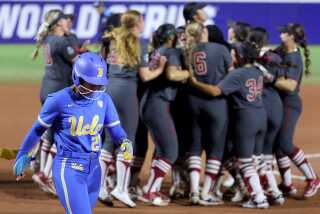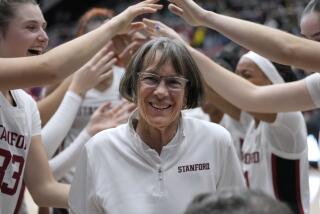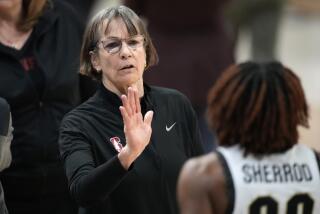For Graham, the Pros Outweighed the Cons of Leaving Stanford : Tennis: Los Amigos High graduate leaves college to test her skill on the professional tour.
FOUNTAIN VALLEY — Maybe if she hadn’t won two matches at the French Open. Or played at Wimbledon. Or reached the quarterfinals of the Mazda Classic. Or turned down almost $100,000 in winnings over the past three years. Or moved from No. 115 to 52 in the world rankings this summer.
Maybe then Debbie Graham would have gone quietly back to Stanford to resume her collegiate tennis career. Graham weighed the pros and cons, and decided in favor of the pros.
It wasn’t so much the money that swayed Graham. After all, it amounts to mere pocket change for Monica Seles. Graham said she’d done it all at Stanford. She won the NCAA singles title in 1990 and helped the Cardinal women’s team to three consecutive NCAA team championships.
There were other worlds to conquer and the time seemed right.
“To go back and play the No. 1 player from UOP . . . “ said Graham, who lives with her parents in Fountain Valley.
“I’ll always be known as the NCAA champ. No one can take that away (from me). It was a great experience. (But) I’m afraid if I waited a year I could be a different player, or person. With another year of college tennis I might fall behind.”
After a quarterfinal appearance at the Mazda Classic in Carlsbad two weeks ago, Graham decided to turn pro, giving up her scholarship at Stanford. She plans to return to school to complete her degree in political science and graduate in January.
“The past year people have been asking, ‘Why are you going back to Stanford?’ ” she said. “I’ve always thought about it (turning pro). Going back to Stanford now would be really difficult.
“If we (Stanford) hadn’t won three NCAA titles and I hadn’t won the singles title, it would have been different. I would have gone back if I hadn’t already helped the team.”
Graham has always seemed to have a well-thought-out plan, even when she a top-ranked juniors player.
At first, tennis was nothing special for the Graham family. James and Jacqueline Graham wanted their eldest daughter to be involved in a variety of sports. But Debbie liked tennis best and asked for more lessons.
At 13, she began playing in tournaments. At 15, she won the United States Tennis Assn.’s 16-and-under national singles and doubles titles.
At 16, she won a gold medal at the Olympic Festival in Durham, N.C. At 17, playing as an amateur, she scored an upset in her first pro tournament--beating Elly Hakami in the first round of the Virginia Slims of San Diego.
At 18, she helped Stanford win the first of three consecutive NCAA team titles. At 19, she won the 1990 NCAA singles title, 6-3, 6-3, over Nicole Arendt of Florida.
And at 20, Graham had seen enough of collegiate tennis and decided to turn pro.
She said she always hoped this moment would come, but now that it’s here, she’s surprised it was this easy.
“When I was younger I said, ‘OK, I’m going to play four years of college tennis,’ ” Graham said. “I wasn’t expecting too much. I never expected to be ranked this high this soon.”
Since graduating from Los Amigos High School, Graham played pro tournaments as an amateur but never took it all that seriously.
“I had two months every summer to fool around,” she said. “I thought I’d use my tennis to see different people. It was like free travel.”
It had become a familiar, comfortable pattern. Graham played hardest in the summer, then buckled down with her school work and managed to find a few hours each day to practice. Often, she said, her tennis was uninspired.
Graham approached last week’s Virginia Slims of Los Angeles, her debut as a pro, differently. She stopped her habit of hanging around with friends after her matches.
“I have to take it a lot more seriously now,” said Graham, who advanced to the third round before losing to second-seeded Gabriela Sabatini, 6-3, 6-1. “It’s going to be my income. I have to give up my normal routine.
“I want to go all the way to the top. I want to be the first college player to be ranked in the top 10. I want to win a Grand Slam tournament. My next goal is the Top 20, then I want to maintain the Top 10. Eventually, I want to be No. 1.”
More to Read
Go beyond the scoreboard
Get the latest on L.A.'s teams in the daily Sports Report newsletter.
You may occasionally receive promotional content from the Los Angeles Times.










